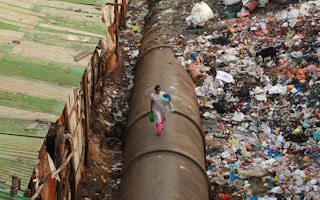Together with air, water is arguably the planet’s most important natural resource. Functioning water systems are one of the technological pillars of civilisation, which often makes a water crisis a matter of life or death.
Today, about two billion people lack access to safe drinking water, and roughly half the world’s population experiences severe water scarcity for at least part of the year. Our limited freshwater resources are already overburdened by growing populations and water-thirsty economies.
By 2030, global water demand will have exceeded the sustainable supply by 40 per cent. As demand for water grows and temperatures rise, water scarcity will threaten more lives and livelihoods – and thus the stability of societies around the world.
How can we turn the tide so that water empowers communities, secures our economies, and keeps the planet livable? As with global public goods such as a clean environment, there is a tendency to focus on the costs of improvement today, rather than on the greater long-term benefits of investing in the preservation of natural resources.
The water sector today is underfinanced and chronically short of capacity to meet demand. But if we want to achieve the Sustainable Development Goal (SDG) of ensuring clean water and sanitation for everyone, we must increase current global spending on water fourfold, to more than US$1 trillion per year (1.21 per cent of global GDP). We also must make up for the US$470 billion we lose every year through flood damage and poor irrigation.
By protecting the environment and the climate, every cent invested in the water sector boosts our economies, now and in the future. When the European Investment Bank provided a €200 million (US$215 million) loan to Jordan last December to finance a desalination plant on the Red Sea and a pipeline to the capital, Amman, the country’s planning and international cooperation minister, Zeina Toukan, described these projects as crucial for both water security and comprehensive economic development. We all need to adopt similar thinking about how we value and manage water.
“
Water is what will carry the SDGs across the finish line. We must finally start recognising it as a fundamental part of our investment portfolios, and put it at the centre of our economic policies.
As with many other challenges, the public sector cannot fill this large investment gap alone. Businesses have an important role to play. According to the CDP, a not-for-profit organisation that collects environmental-impact data, more than US$300 billion of business value is at risk globally if no action is taken to address water scarcity. Yet it will cost only one-fifth of that total – US$55 billion – to tackle the problem.
If businesses deploy new technologies to reduce their water consumption and to exploit wastewater as a source of energy, heat, nutrients, and materials, they can reduce their environmental footprint and free up more water for use by others.
The CDP values such “water-related opportunities” at US$711 billion, reflecting not just savings on water use but also the growth of long-term potential markets in water-smart technology and the benefits of better community relations. Because water is cheap in most parts of the world, businesses often have little incentive to invest in saving water or in boosting the efficiency of water-intensive production processes.
To persuade the private sector to focus on water-system preservation, we first need to start thinking of money spent on water as a real investment, rather than as a cost that can never be recovered. Second, the right value must be assigned to this water in order to create the necessary incentives for users and businesses to use it more efficiently, and for preservation to be economically rewarding.
In the case of water, this requires a delicate balancing act, because affordable access to drinkable water and sanitation is a recognised human right – which means it is non-negotiable. Third, global cooperation and new cross-border programs to mobilise greater investments in water would overcome market failures and prevent water from being politicised and weaponised.
This week’s United Nations 2023 Water Conference in New York, the first such gathering since 1977, is a unique opportunity to discuss water security and to tackle the crisis head-on and to acknowledge that water investment is as critical to a sustainable and just economy as is clean-energy investment.
We can establish new guidelines for fixing the water cycle and ensuring a more holistic approach to sustainable development everywhere, from the Netherlands and Luxembourg to Nigeria and Laos. And we must find more ways to incentivise water financing from public and private sources that are willing to wait for their investments to bear fruit.
Water is what will carry the SDGs across the finish line. We must finally start recognising it as a fundamental part of our investment portfolios, and put it at the centre of our economic policies.
Ambroise Fayolle is Vice President of the European Investment Bank. Henk Ovink is Special Envoy for International Water Affairs for the Kingdom of the Netherlands.
Copyright: Project Syndicate, 2023.
www.project-syndicate.org










